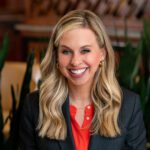Jill Waggoner: You’ve mentioned your vision for next year’s annual meeting as “Jesus is the Center of it All.” What does this mean for us as believers and for the SBC as a whole?
Ed Litton: I loved J.D. Greer’s theme: “The gospel above all.” The Lord made it very plain to me that it is one thing to say the gospel is above all, but what really makes the gospel above all? Jesus has to be at the center of it all. We can assume that is the case for people, but I think it is a false assumption. It is a constant [work] in my life to make sure Jesus is the center of it all. I think the struggles we’re facing as a convention are going to be helped when we return to our first love.
JW: What do you see as the greatest challenges facing the SBC?
EL: I think unity is key, and it’s what I hear the most from people. I’m teaching right now in the book of Philippians. The very text I’m going to be approaching this Sunday, chapter 2:1-11, tells us what unity is, what destroys unity, and ultimately, our example of unity is Christ. We have to become self-forgetful and Christ-centered. Unity is something we all have a choice in — how we’re going to live and participate, how we’re going to disagree with one another. The toxic nature of the public discourse within the SBC should be alarming to all of us.
I hear people say [things] about one person versus another person in our convention. I hear all the time: “He hates this other person.” That’s unbecoming a child of God. That is so elementary and so clear. One might say, “Well, that’s not his problem. That’s what people are saying.” We need to clean up our public discourse. We need to go back to the basics of the gospel, and with Jesus as the center of it all. We must say, how does that mean I treat my neighbor?
Obviously, we’re having issues with sexual abuse, and the convention in Nashville was very clear they want that addressed. I think, also, that racial reconciliation is huge. Southern Baptists said, as they added to the 2025 vision, those two things. One of our greatest leaders of my lifetime, Fred Luter, said, “Southern Baptists just don’t do racial reconciliation well.” That’s wrong [of us] because the Scripture is very clear. This is not a theory. This is biblical, gospel reconciliation.
JW: What does the SBC need to do to make our churches safe for survivors and safe from abuse?
EL: Some of our state conventions have really led the way in this. They have taught pastors, and they hold seminars for pastors. But we need this in every state. We need a national convention focused on how we prepare pastors in seminary to know how to report and what to report, so that is the first line of defense. Then there are other things we can do to make our churches safer for children and safer for the vulnerable. We also have to be safe for those who have been abused. They need to know that they will be heard, that they will be seen, and that we care about their suffering. All of those things are important.
The convention made it powerfully clear that we’re to have an investigation of our own Executive Committee. It’s always a painful thing to be investigated, but the truth is what sets us free, and we need to know the truth.
JW: How can God redeem times of suffering? What have you learned about God and his work in your own life?
EL: One of the first questions I was asked after my wife, Tammy, died was, did your view of God’s sovereignty help you or hurt you? I said yes.
It was utterly devastating that God would let me hurt that bad. But at the same time, it was the most comforting thing that this wasn’t an accident. I’m still a part of a divine plan, and God is moving through that suffering. Now, it’s not automatic because you have a choice as to what attitude and mind you will have toward suffering.
We often, as Baptists, are critical of the health-and-wealth gospel, but I think we have our own form of health-and-wealth gospel — that everything’s going to work out great. My kids are going to be good and not embarrass me too much. But the reality is that is a false gospel. Our salvation came through suffering. And Jesus [said] to take up your cross and follow me. He didn’t say, take up your Lexus and follow me. We’re on a mission with him into a world of suffering.
By the way, our credibility for the gospel hinges on how well we suffer. We have the resources for suffering. We have a presence of the powerful Holy Spirit of God. Jesus walks with us. He draws near to the broken-hearted and those who are crushed in spirit. We cling to his Word. We comfort one another. We pray for people that suffer. My church was the most amazing ministry to me in my times of suffering. Ultimately [suffering] is the platform for the gospel.
One of the reasons our churches are not as effective as we could be or should be is because we have gotten distanced from the world that’s hurting. People don’t think of us when they’re hurting. They think of a bar. They think of drugs. They think of maybe a counselor or a therapy or another religion. But they need to think of us as people who know what suffering is about. Our best, and most effective, evangelism is when we’re not separated from the world, but we are actually showing them the love of Jesus Christ in the midst of their suffering.
JW: What encourages you the most about the SBC?
EL: The thing that encourages me the most right now is that Southern Baptists are a praying people. The people who came to the convention [in Nashville], or didn’t come to the convention, pray. Other presidents have told me that there is a unique power in this role that comes from the fact that Baptists pray.
The other thing is watching our SBC Disaster Relief work. Kathy and I stumbled onto Disaster Relief workers in Grand Lake, Colorado, nine months after a tremendous fire had swept through that region, hit the Rocky Mountain National Park, and destroyed homes. They are still out there ashing out homes, and most of them are in their 70s! Man, what a great way to spend your retirement. I encourage [your readers]: Don’t think about sitting on a beach the rest of your life. These people are out there doing hard work, loading heavy equipment, but with smiles on their faces, sharing the gospel with people and the love of Jesus. That, along with what’s happening with hurricane relief and what’s happening on the border with different associations and churches that are feeding the hungry and helping, is one of the greatest testimonies of what we really believe.
JW: How should we be praying for the SBC and Christians, particularly in America?
EL: Pray that we will return to our first love, that Jesus will be the center of it all. That we will renew our focus on sending missionaries and planting churches, revitalizing churches and making your own church revitalized. We’re in a terrible time coming out of COVID. We keep using that terminology. I’m not sure we’re out of this time, but wherever we’re at right now, we have to be there, and we have to say, “All right, what’s God’s plan?” I don’t know of any pastor whose church has grown during the COVID times. I’m sure there are some. Most of us, however, have suffered profoundly. I have buried more people that I love in the last two years than I want to ever think about.
It’s important that we ask the Lord, what are we doing here? What would you have us do differently? We can’t hold on to things that we’ve always done. We’ve got to say, “Lord, what are you doing,” and follow him. That’s one of the greatest challenges for any pastor.
Pastors are exhausted. This is a good time for us to put ourselves before the Lord. One of the best and most dangerous verses in the Bible is in Psalms: “Search me, O God, and know my heart. Test me and know my anxious thoughts” (Psa. 139:23). God wants us to enter into a time of not just renewal and refreshing, but a time of really searching out our motives, and, ultimately, getting back to the simplicity of the gospel.










